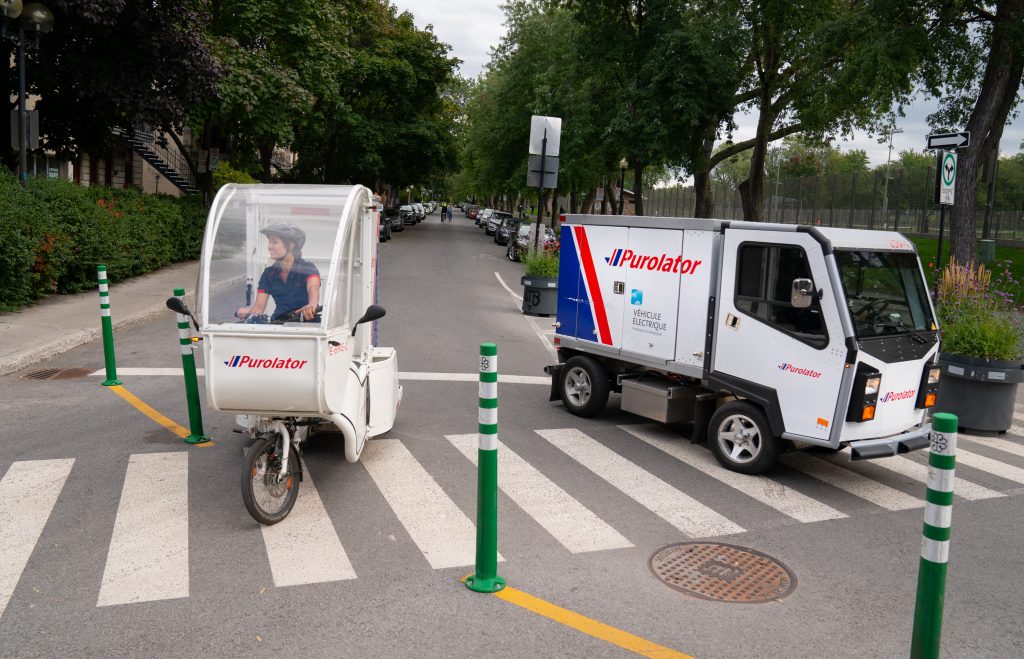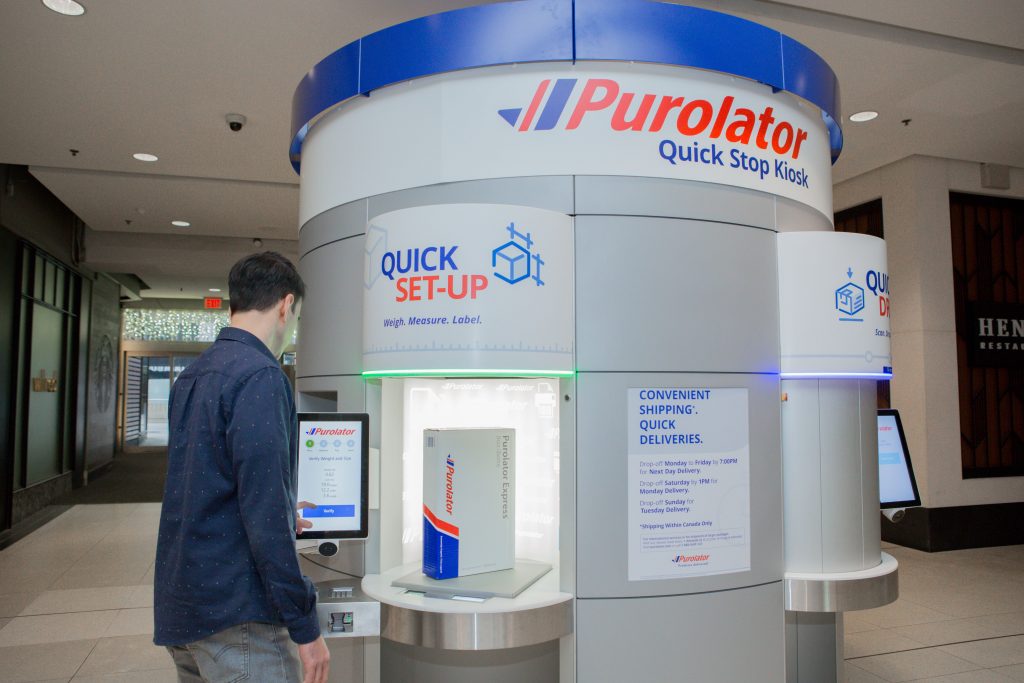Over the past year, Purolator has launched several initiatives that make it even easier for millions of Canadians to ship and receive their packages, on time and hassle-free.
In time for the 2019 holiday season, Purolator launched the Quick Stop Kiosk, Canada’s first self-serve ‘shop and drop’ retail standalone kiosk. Originally piloted in Toronto’s Eaton Centre, it offers a speedy, self-serve solution for customers to pack, label and ship their packages at a central location. “For our customers, it’s all about speed, convenience and low-contact transactions,” says Laurie Weston, Purolator’s director of retail. “In less than five minutes, you can prepare and ship packages directly from the kiosk.”
Shoppers simply create their shipping label, pay, place the package into the unit and print a receipt for tracking. To save time, Purolator account customers can also drop off their prepaid shipments.
For Purolator, the Quick Stop Kiosk initiative is a win-win. It improves logistical shipping efficiencies, saves time and offers more customer-service options and locations, especially during peak holiday seasons. Costs of courier pickups and drop-offs are partially alleviated as well.
“We had an incredible amount of positive feedback from the pilot. We learned that our customers want to ship quickly without long interactions, especially during the Covid-19 pandemic,” explains Weston. “The Quick Stop Kiosks reduce the time customers are in our facilities by 40%, so it’s a great complement to our network.”
The pilot was so successful that the Quick Stop Kiosk initiative has been expanded to 11 locations in the Greater Toronto Area as part of the second rollout phase. As an added feature, the kiosks enable contactless merchandise returns to retailers via a QR code printed right from the location.
Fleet transformation
Demonstrating its commitment to a more energy-efficient, low-carbon economy, Purolator recently launched two environmentally responsible alternatives to the traditional delivery truck. The electric low-speed vehicles (LSVs) and electric cargo bikes (e-bikes) offer new ways to deliver packages without the constraints or fuel requirements of traditional trucks. With a focus on city logistics, Purolator is helping dense metropolitan cities operate more smoothly and sustainably through new delivery methods.
The LSVs, for example, have a maximum speed of 40km/h. Making only one stop to refill with more packages, these vehicles have enabled Purolator to achieve up to 111 deliveries per day, with 156 pieces on an LSV route in Montreal, replacing a typical standard-size delivery vehicle in the company’s fleet.

“We’ve been able meet our existing productivity targets early on in our deployment,” comments Roger Alouche, Purolator’s senior director of strategic operations. “These vehicles no longer compete for parking or stop for refueling, so we are expecting to set new productivity and cost standards. Plus, the vehicles’ zero emissions make the cyclists and pedestrians we share the road with especially happy.”
The e-bikes complement the fleet nicely as well. Piloted in Montreal, the bikes run on a mix of pedal power and electricity through city streets. This comes in handy when faced with road closures or narrow pathways. Purolator has registered an average of 92 pieces to 65 delivery stops per day with the e-bike, making this fleet option a mainstay in a rapidly changing urban landscape across Canada’s big cities.
Together, the LSVs and e-bikes represent a 40% cost saving for every stop. However, the reductions in greenhouse gas emissions from these innovations make them worth much more.
The move to offer more innovative, environmentally sustainable vehicles supports Purolator’s long-term goal to reach net-zero emissions by 2050. Thanks to the positive response from customers and city officials, the company plans to deploy more vehicles in metropolitan areas throughout Canada in 2021.
Key facts
- The Quick Stop Kiosks reduce the time customers spend in Purolator’s facilities by 40%
- The electric low-speed vehicles can make 100+ deliveries per day
- The new vehicles represent a 40% cost saving on every stop
This article was originally published in the December 2020 issue of Parcel and Postal Technology International.


